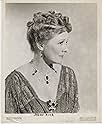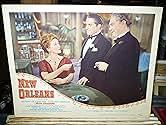Ajouter une intrigue dans votre langueA gambling hall owner relocates from New Orleans to Chicago and entertains his patrons with hot jazz by Louis Armstrong, Billie Holiday, Woody Herman, and others.A gambling hall owner relocates from New Orleans to Chicago and entertains his patrons with hot jazz by Louis Armstrong, Billie Holiday, Woody Herman, and others.A gambling hall owner relocates from New Orleans to Chicago and entertains his patrons with hot jazz by Louis Armstrong, Billie Holiday, Woody Herman, and others.
- Réalisation
- Scénario
- Casting principal
- Nick Duquesne
- (as Arturo De Cordova)
- Louis Armstrong
- (as Original New Orleans Ragtime Band)
- Drummer
- (as Original New Orleans Ragtime Band)
- Clarinetist
- (as Original New Orleans Ragtime Band)
- Trombonist
- (as Original New Orleans Ragtime Band)
Avis à la une
Plus points for jazz fans are that several of the numbers are seen and heard complete, rather than faded out; both Billie and Louis were still near their best; the other musicians, including Kid Ory and Barney Bigard, get to solo, and you hear -- and see - an early version of the Armstrong All-Stars really swinging. There's also a rare sight of the great (and now disappeared) Lucky Thompson behind Louis in one sequence.
A personal note: one of my very first records (78 rpm, early 1950s) was Louis' "Where the Blues Was Born". I guess I had the studio, not the soundtrack version, but both are terrific. It was amazing to SEE that long-treasured performance.
"New Orleans" would not go down well with latter-day jazz musicians because Billie's shown as a maid, and Woody Herman (white) comes into the story for no earthly reason beyond the fact that he was a big name in 1947. But if you can see and hear past all that, the music makes it worthwhile.
OK, it's not a good film. But how many jazz films are? "Jammin' the Blues," "Pete Kelly's Blues," "Sven Klang's Combo," "Round Midnight," and that's it. Only three of those are feature-length, and two are European. For anyone who loves the music, "New Orleans" is well worth viewing.
Now for the good news: within the horrible limits of the concept, the script is relatively well constructed, and Arthur Lubin's direction shows some visual imagination -- notably in the opening tracking shot through the streets of back-lot "New Orleans" before the camera enters Arturo de Cordova's cabaret/casino and discovers Louis Armstrong and his band playing "West End Blues" (inexplicably renamed "Name-Your-Poison Blues" in the film). In her autobiography "Lady Sings the Blues" Billie Holiday vividly registered her disgust at being cast as a maid, and in the scenes with Dorothy Patrick she's visibly stiff, barely able to get the servile dialogue out of her mouth -- but when she shows up at the cabaret set and gets to sing with Armstrong's band she visibly loosens up and becomes a relaxed and quite effective screen presence. My partner noted the similarities between "New Orleans" and the 1936 MGM film "San Francisco" -- both are about gamblers who own night clubs and opera singers who climb down from their pedestals to perform popular music, and the (real) closure of New Orleans' Storyville red-light district in 1917 fulfills the same climactic story function as the 1906 earthquake and fire did in "San Francisco."
The first time I saw any part of "New Orleans" was at a screening of jazz movies in 1970, at which the host presented three numbers from the film ("Do You Know What It Means to Miss New Orleans?," "Where the Blues Were Born in New Orleans" and "Farewell to Storyville") that had been blown up from 8 mm sound prints released for home sales in France. The host said that the rest of the film had been lost, so it was quite surprising to me when I got to see the complete version twice in 1973 on an independent local TV station in the San Francisco Bay Area. Then I didn't see the film again until Kino released it on DVD, and having got over my disappointment at what it could have been, this time I could appreciate it for what it is: a flawed movie with an almost unbearably pretentious ending but still a quite entertaining film as well as a chance to see Armstrong and Holiday at the peak of their powers. (Woody Herman is hardly showcased to good effect even though he was leading perhaps the best band of his career, the "First Herd," at the time.) And I'm surprised the other commentator mentioning the greatest jazz movies left out my all-time favorite, Clint Eastwood's "Bird."
Le saviez-vous
- AnecdotesThis is the only time Billie Holiday performs in a feature film.
- GaffesIn the first scene, there is a shot of Basin Street, and the year 1917. One hears "West End Blues" playing, which was not recorded until 1928.
- Citations
Henry Ferber: That note isn't even in the diatonic scale.
Louis Armstrong: Diatonic? Did I do something wrong?
Henry Ferber: Something extraordinary. You are playing notes between flat and natural. It's like discovering - a secret scale just made for this type of music.
Louis Armstrong: Horn, did you hear what the gentleman said?
- Versions alternativesThere is an Italian DVD edition of this movie, distributed by DNA Srl, entitled "La città del Jazz". The movie was re-edited with the contribution of the film history scholar Riccardo Cusin. This dvd contains the movie with its original aspect ratio and a new version adapted in 1.78:1 anamorphic for 16:9 screens. This version is also available in streaming on some platforms.
- ConnexionsEdited into Billie Holiday: The Ultimate Collection (2005)
Meilleurs choix
- How long is New Orleans?Alimenté par Alexa
Détails
- Durée1 heure 30 minutes
- Couleur
- Rapport de forme
- 1.37 : 1
Contribuer à cette page




























